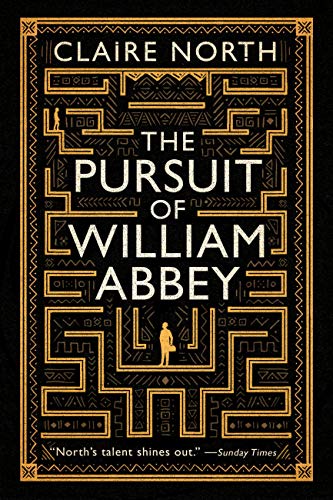
![]() The Pursuit of William Abbey by Claire North
The Pursuit of William Abbey by Claire North
“I do not know whether death is mercy, or love is easy, or vengeance is peace, or if all these things are lies or truth. Or if it is the truest thing of all to say that life is all of these things, all of these truths together in perfect contradiction, blinding us to a greater truth that lies beneath.”
My husband and I are foodies. We love to try new foods, new cuisines, and new restaurants. When we order off the menu, we each order different meals so that we can share and try multiple items. When we re-visit restaurants, we rarely order what we’ve already tried. At our favorite restaurant, the chefs are always experimenting. We like to sit at the chef’s table and order the six-course tasting menu which is different every time. It’s innovative and original and delicious.
Occasionally, however, something goes wrong. Maybe one of the courses is too heavy (that happened once with a fried stuffed squash blossom that ruined our appetites for subsequent courses) or maybe the dessert passes the bounds of creative and just gets weird. That happened years ago when the dessert course was a tribute to breakfast. The chocolate-covered bacon and the custards that looked like eggs were more fun than tasty. We don’t mind these little missteps. Instead, we laugh it off and agree that we love the spirit of a restaurant that is constantly innovating.

Claire North
I’m sure you can see where I’m going with this. Claire North is like my favorite restaurant and I hold her in the very highest esteem. She is a brilliant writer and probably the thing I admire most about her work (aside from her exquisite prose) is how diverse and experimental it is. She is always challenging herself. I didn’t love her most recent effort, The Pursuit of William Abbey, (2019) and I’m totally fine with that. It doesn’t bother me at all. I recognize that it’s bound to happen occasionally, just like that fried squash blossom. And I can’t wait to try the next Claire North novel. I will always read Claire North, just like I’ll always go back to my favorite restaurant even after a less than exquisite meal, because I understand their philosophy, they are excellent at their craft, and I can’t wait to see what they do next.
The Pursuit of William Abbey is about a young English doctor (William Abbey) who sees, but does not interfere with, the lynching of a boy in South Africa in 1884. The boy’s mother curses William with the boy’s shadow which follows him at a walking pace. When the shadow catches up with William, someone William loves will die. William must remain on the move, never settling in for long in any place. As the shadow gets closer, William is cursed with the ability to hear other people’s thoughts. That’s how he knows the shadow’s arrival is imminent and he must move again. And that’s why the British government wants him to spy for them — he knows what people are thinking. As he wanders, William meets others who suffer the same curse, as well as a mad scientist who wants to figure out how the curse works.
The Pursuit of William Abbey is a brilliant book with a fascinating premise, an interesting frame-story structure, glorious prose, substantive themes (truth, justice, anarchy, vengeance, mercy), and a modern sensibility as it addresses such issues as colonialism, workers’ rights, healthcare, marriage equality, and racism in the judicial system.
The reason I didn’t enjoy The Pursuit of William Abbey, despite recognizing its excellence, is mostly that the story moves too slowly and is painful on every page. For example, when William begins hearing people’s thoughts, they’re usually evil. And as William considers turning against England, he ruminates on England’s evil actions on the world stage (e.g., snatching up colonies in the name of “spreading Christianity”). The plot is so full of people’s badness that it’s unpleasant, wearisome and, eventually, tedious.
Many readers will disagree with me, and I won’t say they’re wrong. This is simply a matter of taste. The Pursuit of William Abbey is an excellent (but, for me, not enjoyable) book that deserves to find readers who love it. I would have enjoyed it if it hadn’t been so relentlessly dark. And I can’t wait to read Claire North’s next book!
Hachette Audio’s edition of The Pursuit of William Abbey is narrated by the consistently amazing Peter Kenny who always does such a good job with North’s work. It is exceptional. It’s 12.5 hours long.



Do it! One of the best things I've read in recent years.
This reminds me. I want to read Addie LaRue.
We’re in total agreement David!
I felt just the same. The prose and character work was excellent. The larger story was unsatisfying, especially compared to…
Hmmm. I think I'll pass.